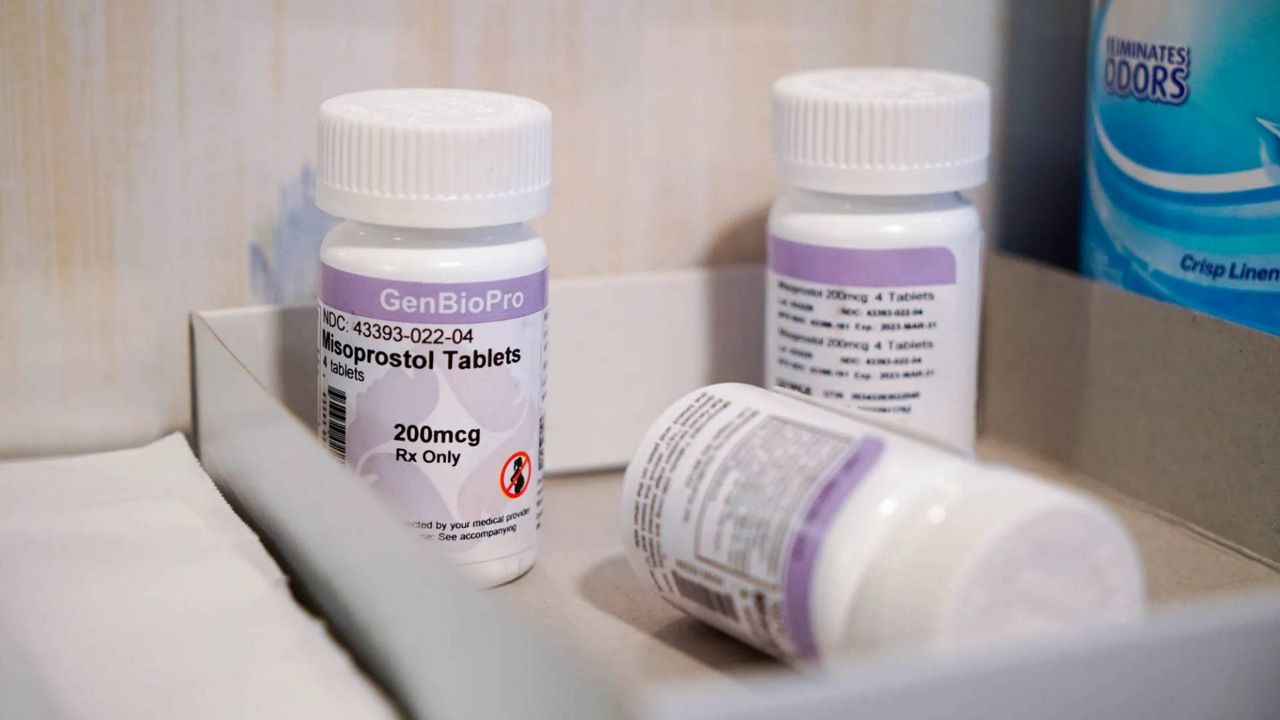The White House on Wednesday proposed a new federal rule to limit how law enforcement and state officials collect medical records if they investigate reproductive health care providers and women who flee their home states to seek abortions elsewhere.
"I have met for example, with a woman by the name of Amanda, who talked with me and met with she and her husband, about how when she was pregnant, she then had suffered a miscarriage. And three times went to seek medical care and was denied because of the health care providers fear that they would be prosecuted or in some way, penalized for helping her through her miscarriage," said Vice President Kamala Harris at a livestreamed meeting on Wednesday alongside Health and Human Services Secretary Xavier Becerra and Attorney General Merrick Garland.
"I have met with and talked with doctors who are in fear of losing their license of being prosecuted, and of this situation actually having an impact on the relationships of trust that they have with their patients," Harris added. "This indeed is a health care crisis in America. And we have to acknowledge and understand it to be just that."
The proposal, prompted by a string of blows to abortion access across the country, follows a federal judge’s ruling on Friday that threatens to pull the most commonly used abortion pill, mifepristone, off the market.
The White House’s proposed rule would prohibit health care organizations from sharing personal medical records with authorities for investigations related to reproductive care in states where a woman legally obtained an abortion. While medical records are protected by federal privacy laws, health providers and insurers can be compelled to turn over medical records with a court order.
"We believe that this rule will assure that doctors, other health care providers and health plans will not be disclosing individuals protected health information, including information related to reproductive health care," Becerra said at the meeting. "This rule will strengthen privacy protections for patients and providers. And we hope that what we can do is send a clear message that we will continue to make sure that people are afforded their rights."
Becerra said the U.S. Department of Health and Human Services will also issue guidance to help providers protect patients' electronic health records, including reproductive health care information.
Doctors around the country have voiced concerns about protecting that medical information from law enforcement officials, said Melanie Fontes Rainer, the director of the office of civil rights at HHS, which proposed the rule change.
“We’ve had many conversations with providers, major medical associations and patient advocates about what they’re seeing on the ground and how the federal government can be helpful in ensuring medical records are kept private,” she said in a statement.
HHS will also begin the process of establishing a national hotline to provide referrals to people seeking information on their legal and reproductive health options.
And Garland said the U.S. Department of Justice will continue to defend the Food and Drug Administration's authority to approve abortion medications, challenge state abortion bans that limit care in emergency medical situations, protect the right of people seeking abortion care to travel to different states, and give resources and training to U.S. Attorneys across the country to prosecute those who obstruct access to abortion services through violence, threats, and property damage.
Since the U.S. Supreme Court overturned the constitutional right to an abortion last year, some women living in a stretch of Southern and Midwestern states that have largely outlawed abortion now travel hours to other states to get abortions legally.
For months, the White House has struggled to counter the abortion restrictions Republican-led states have rolled out since the Supreme Court overturned the constitutional right to the medical procedure last June.
"Our administration and our president, Joe Biden, has been very clear that we will stand to protect the integrity of the health care system in America," Harris said on Wednesday. "And we will stand to protect those who have a right to be able to make decisions about their own body and their own life."
Many abortion clinics, some offering medication-only abortions, have relocated to Democratic-leaning states, preserving some sort of access for millions of women around the country. Now, the Biden administration is staring down a challenge to abortion access that could alter how women get abortions nationwide.
Texas Judge Matthew Kacsmaryk rule the abortion pill mifepristone should be taken off the market, which threatens to upend abortion access for the entire country by Friday if another court doesn’t step in. The Justice Department appealed the ruling on Monday.
Kacsmaryk’s decision would revoke the Food and Drug Administration’s approval of mifepristone, one of two drugs used in what is considered the most effective and safest way to carry out a medication abortion. There is no precedent for a lone judge to overrule the FDA’s medical decisions, and pharmaceutical executives said Monday they fear the ruling could jeopardize the approval of vaccines and other medications.
"It would deprive patients of a safe and effective medication to manage their reproductive health, and it would allow doctors to challenge FDA approval of any drug or any other federal action that allegedly injured third parties," Garland said on Wednesday. "This could happen to any medication that Americans rely on, no matter how essential it is. And no matter how long ago it was approved."
A competing ruling by a federal judge in Spokane, Washington, issued on the same day directed federal officials not to hinder access to the drug in at least 17 states where Democrats sued to keep the drug’s availability intact. The issue is likely to be decided by the Supreme Court.



